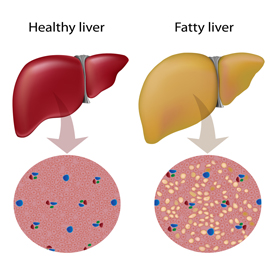
Fatty Liver Disease (FLD), also known as Non-Alcoholic Fatty Liver Disease (NAFLD), is the accumulation of fat in the liver. This can be seen in alcoholics as well, but NAFLD refers strictly to such a thing occurring in someone who drinks little to no alcohol. Having small amounts of fat around the liver is normal and often does not result in any symptoms or complications. However, if NAFLD is not treated and more and more fat accumulates, worsening the disease, it becomes known as Non-Alcoholic Steatohepatitis (NASH), which can lead to liver scarring, cirrhosis of the liver and possibly liver failure.
Risk Factors of Fatty Liver Disease
A direct cause for Fatty Liver Disease developing has not yet been established, but there are many factors that can increase risk for NAFLD.
The risk factors include:
- Obesity
- High levels of triglycerides and cholesterol
- Metabolic Syndrome
- Type-2 Diabetes
- Sleep Apnea
- Polycystic ovary syndrome
- Hypopituitarism
- Hypothyroidism
Symptoms
NAFLD is asymptomatic, meaning that individuals are usually unaware that they even have the disease, sometimes going years or their entire life without finding out. However, some known symptoms include fatigue, abdominal pain and weight loss.
Treatment for Fatty Liver Disease
There is no standard method of treatment for FLD. Rather, doctors treat the risk factors contributing to the existence of FLD. With obesity being one of the more common risk factors for NAFLD, losing weight through diet, exercise, healthy lifestyle changes, medication and surgery is a great way to combat the onset of Fatty Liver Disease. As well, if you’re diagnosed with FLD, you’ll want to avoid putting any extraneous stress on your liver such as drinking alcohol.

